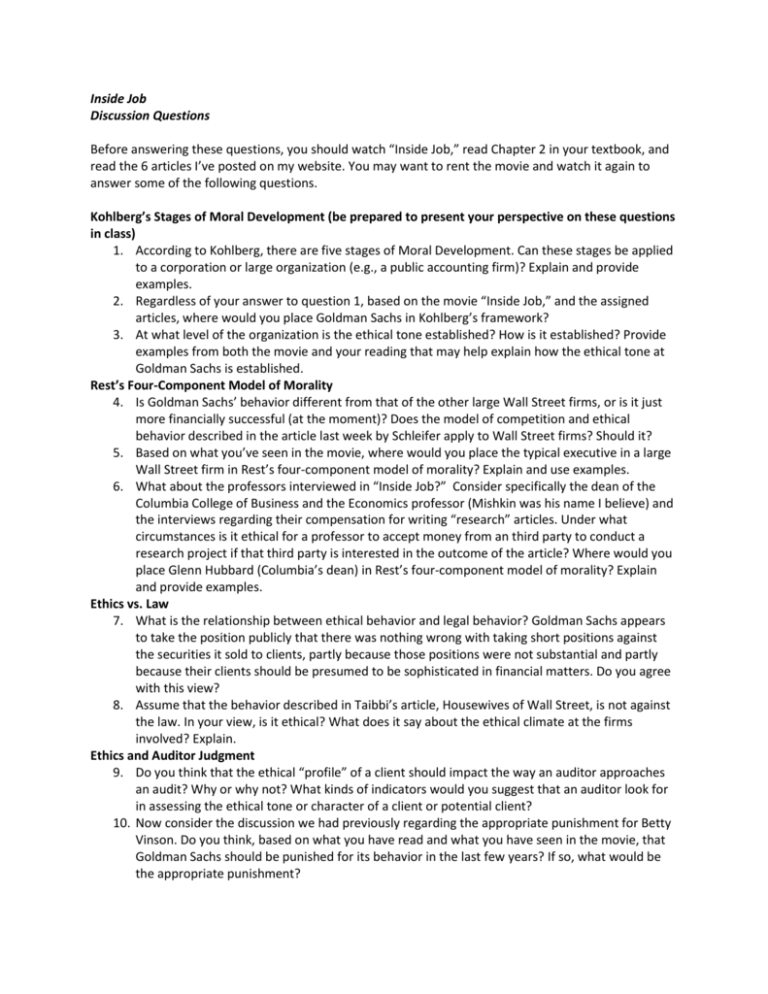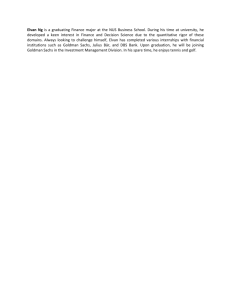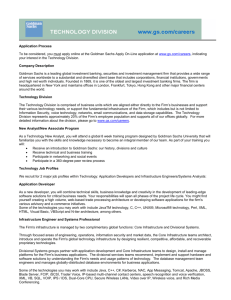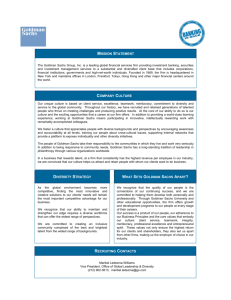Inside Job Discussion Questions Before answering these questions
advertisement

Inside Job Discussion Questions Before answering these questions, you should watch “Inside Job,” read Chapter 2 in your textbook, and read the 6 articles I’ve posted on my website. You may want to rent the movie and watch it again to answer some of the following questions. Kohlberg’s Stages of Moral Development (be prepared to present your perspective on these questions in class) 1. According to Kohlberg, there are five stages of Moral Development. Can these stages be applied to a corporation or large organization (e.g., a public accounting firm)? Explain and provide examples. 2. Regardless of your answer to question 1, based on the movie “Inside Job,” and the assigned articles, where would you place Goldman Sachs in Kohlberg’s framework? 3. At what level of the organization is the ethical tone established? How is it established? Provide examples from both the movie and your reading that may help explain how the ethical tone at Goldman Sachs is established. Rest’s Four-Component Model of Morality 4. Is Goldman Sachs’ behavior different from that of the other large Wall Street firms, or is it just more financially successful (at the moment)? Does the model of competition and ethical behavior described in the article last week by Schleifer apply to Wall Street firms? Should it? 5. Based on what you’ve seen in the movie, where would you place the typical executive in a large Wall Street firm in Rest’s four-component model of morality? Explain and use examples. 6. What about the professors interviewed in “Inside Job?” Consider specifically the dean of the Columbia College of Business and the Economics professor (Mishkin was his name I believe) and the interviews regarding their compensation for writing “research” articles. Under what circumstances is it ethical for a professor to accept money from an third party to conduct a research project if that third party is interested in the outcome of the article? Where would you place Glenn Hubbard (Columbia’s dean) in Rest’s four-component model of morality? Explain and provide examples. Ethics vs. Law 7. What is the relationship between ethical behavior and legal behavior? Goldman Sachs appears to take the position publicly that there was nothing wrong with taking short positions against the securities it sold to clients, partly because those positions were not substantial and partly because their clients should be presumed to be sophisticated in financial matters. Do you agree with this view? 8. Assume that the behavior described in Taibbi’s article, Housewives of Wall Street, is not against the law. In your view, is it ethical? What does it say about the ethical climate at the firms involved? Explain. Ethics and Auditor Judgment 9. Do you think that the ethical “profile” of a client should impact the way an auditor approaches an audit? Why or why not? What kinds of indicators would you suggest that an auditor look for in assessing the ethical tone or character of a client or potential client? 10. Now consider the discussion we had previously regarding the appropriate punishment for Betty Vinson. Do you think, based on what you have read and what you have seen in the movie, that Goldman Sachs should be punished for its behavior in the last few years? If so, what would be the appropriate punishment?






